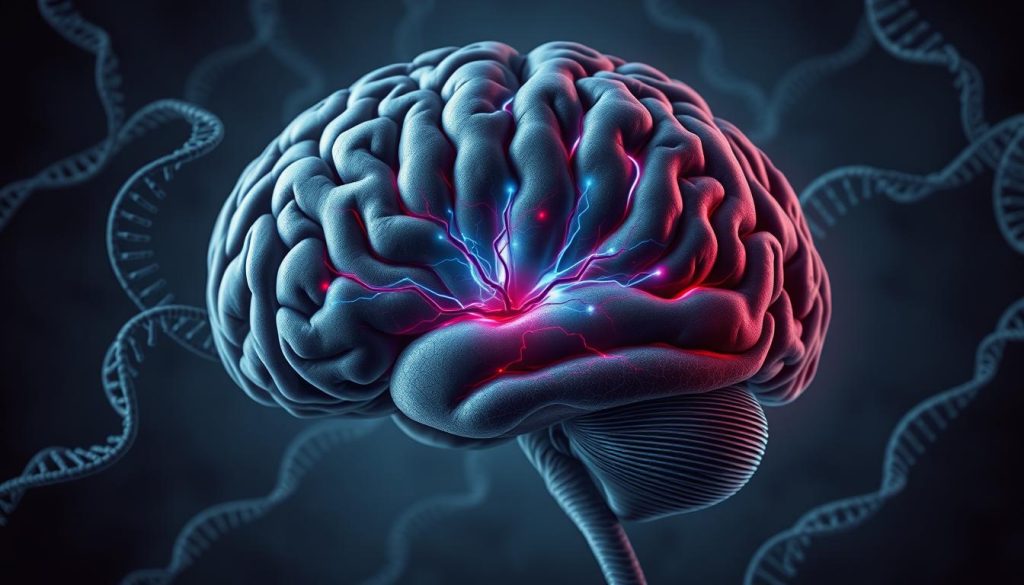Antisocial personality disorder (ASPD) is a serious condition often misunderstood. It involves a pattern of ignoring others’ rights. People with ASPD may act without guilt or care for others.
It’s important to understand the deep emotional pain caused by such actions. This knowledge helps us better support those affected.
ASPD is marked by a lack of empathy, a tendency to lie and manipulate, and impulsive decisions. These traits are key to diagnosing the disorder. It’s crucial to approach this diagnosis with empathy and objectivity.
Key Takeaways
- ASP diagnoses are complex, involving a pattern of rights violations.
- The defining characteristic involves lack of remorse and empathy.
- ASPD is associated with deceitful, exploitative behaviors.
- Understanding ASPD is critical in dispelling associated stigma.
- Characteristics of such disorders have deep emotional impacts on connections.
- Professionals use a standardized set of criteria for diagnosis of antisocial behavior.
Understanding Antisocial Personality Disorder
Antisocial Personality Disorder (ASPD) is a complex condition. It involves behaviors that go against what society expects. This section will cover the basics of ASPD, including its clinical description and history.
Definition and Overview
An antisocial behavior definition says ASPD is a mental disorder. People with ASPD don’t care about right or wrong. They ignore others’ feelings and rights.
They often bully, manipulate, or treat others cruelly. They don’t think about the harm they cause. They also don’t take responsibility for their actions.
The ASPD overview today comes from the DSM-5. It says ASPD starts in childhood or early teens. It lasts into adulthood. Key signs include lying, acting on impulse, not caring about safety, and being irresponsible.
Historical Context
The history of antisocial personality disorder diagnosis has changed a lot. At first, it was seen as a moral issue. But, as psychology and psychiatry grew, views changed.
In the early 20th century, it was called “moral insanity.” Later, it became “psychopathic personality” and then ASPD. This shows how our understanding has evolved.
Looking back, how we diagnose ASPD has changed. We now see it as a medical and psychological issue. This shift helps us treat ASPD more compassionately.
| Year | Diagnostic Term | Key Characteristics |
|---|---|---|
| Early 1800s | Moral Insanity | Lack of moral consciousness and ethical orientation. |
| Early 1900s | Psychopathic Personality | Behavioral issues, inability to form emotional attachments. |
| 1980 | Antisocial Personality Disorder | Incorporated into the DSM-III, focusing on observable behavioral patterns. |
Key Characteristics of Antisocial Personality Disorder
Antisocial personality disorder (ASPD) shows itself through certain behaviors and feelings that go against social norms. Knowing these traits helps spot ASPD early. This can lead to early help and support.
Lack of Empathy
People with ASPD often don’t care about others’ feelings. They don’t just not get it; they don’t care. This is clear in how they treat others, ignoring their emotional needs.
Deceitfulness and Manipulation
Manipulation is key in ASPD. People might lie or use charm to get what they want. This can hurt relationships, as trust is often broken.
Impulsivity and Risk-Taking
Those with ASPD often take big risks without thinking. This can lead to dangerous driving, drug use, or other risky actions. These actions can cause legal trouble or harm themselves or others.
Learning from those who know ASPD well helps us understand its effects. Here’s a table showing how these traits show up:
| Characteristic | Description | Common Manifestations |
|---|---|---|
| Lack of Empathy | Indifference to others’ feelings | Ignores needs of family, unresponsive to partner’s emotions |
| Deceitfulness | Engaging in manipulation for personal benefit | Lying, charming others for deceit, exploitation of trust |
| Impulsivity | Poor risk management, disregard for consequences | Reckless behavior, substance abuse, legal issues |

Diagnostic Criteria for Antisocial Personality Disorder
To diagnose Antisocial Personality Disorder (ASPD), a detailed assessment is needed. This follows the rules in the Diagnostic and Statistical Manual of Mental Disorders. Mental health experts use the DSM-5 criteria for ASPD. This is key in clinical psychology.
Knowing these criteria is vital for professionals. It helps shape treatment plans.
The DSM-5 Criteria
The DSM-5 lists behaviors and patterns for an ASPD diagnosis. It looks for disregard for others and consistent irresponsibility. These must be seen since the person was 15.
Spotting these patterns is crucial. It helps in making an accurate diagnosis and effective treatment.
Duration and Age Requirements
The DSM-5 says a person must be 18 to get an ASPD diagnosis. But, they must have shown conduct disorder symptoms by 15. This age rule is important for diagnosing correctly.
| Age Group | Required Conditions | Documentation Needed |
|---|---|---|
| Below 15 | Evidence of conduct disorder symptoms | Behavioral reports from school/mental health professionals |
| 18+ | Clear ASPD Traits | Comprehensive psychological evaluation |
Differences Between Antisocial Personality Disorder and Other Disorders
It’s important to understand the differences between various personality disorders. Antisocial Personality Disorder (ASPD) is often confused with other disorders. It has unique behaviors that make it different from Narcissistic Personality Disorder (NPD) and psychopathy. This section will help you understand these differences for better diagnosis.
Comparison with Narcissistic Personality Disorder
To differentiate ASPD and NPD, we need to look at their core traits. Both disorders can involve manipulative actions, but their reasons are different. People with NPD want admiration and think they are superior, because of a big ego and low self-esteem.
On the other hand, those with ASPD ignore laws and others’ rights for their own benefit. They don’t seek admiration like NPD individuals do.
Distinctions from Psychopathy
It’s important to know the difference between psychopathy vs. antisocial personality disorder. Psychopathy is more severe and includes deeper emotional and social problems. Psychopaths lack empathy and feel no guilt, leading to cold and planned actions. ASPD is more about impulsive actions.

By understanding these differences, we can better help people with these disorders. This leads to more effective treatments and better lives for those affected.
Common Symptoms of Antisocial Personality Disorder
Antisocial Personality Disorder (ASPD) shows through many symptoms. These symptoms affect how a person acts and feels, making it hard to live in society. Let’s look at these symptoms to understand ASPD better.
Emotional Symptoms
One key sign of ASPD is emotional detachment in ASPD. People with ASPD often don’t care about others’ feelings. They seem indifferent and don’t understand others well. This makes it hard for them to connect with others or keep relationships.
Behavioral Symptoms
Aggressive behavior is common in ASPD. They might have trouble with the law, ignore rules, and fight or assault others. They rarely feel bad about hurting others, showing no remorse.
Cognitive Symptoms
Those with ASPD have ASPD thought patterns that affect their actions and feelings. These patterns include lying, being manipulative, and only caring about themselves. These distorted thoughts make it hard to treat and manage ASPD.
Treatment Options for Antisocial Personality Disorder
Managing Antisocial Personality Disorder (ASPD) requires a mix of ASPD treatment plans. These plans focus on both psychotherapy and medication. They aim to reduce symptoms and enhance life quality.

Psychotherapy Approaches
Psychotherapy is key in treating ASPD. It helps patients understand their actions, thoughts, and feelings. This leads to positive changes. Important psychotherapy methods include:
- Cognitive Behavioral Therapy (CBT) helps people see their harmful thought patterns. It teaches them to respond better to these thoughts.
- Dialectical Behavior Therapy (DBT) gives tools for managing emotions and checking reality.
- Group therapy lets people with ASPD interact and learn social skills. They do this in a safe setting.
Medication Options
There’s no specific medication for antisocial behavior for ASPD. But, medicines can help with related issues. Common treatments are:
- Antidepressants for depression or anxiety, common in ASPD.
- Mood stabilizers to control mood swings and outbursts.
- Antipsychotics for managing anger and impulses.
Healthcare professionals must carefully evaluate each person before starting treatment. They need to keep an eye on how well the treatment works. This is because everyone with ASPD reacts differently to therapy.
The Role of Environment in Antisocial Behavior
Environmental factors play a big role in the development of antisocial personality disorder (ASPD). Things like family relationships and economic status are key. They work together in complex ways to shape behaviors and traits linked to ASPD.
Family Influence
Family relationships are crucial for emotional and psychological growth. Early family interactions can last a lifetime, affecting one’s likelihood of antisocial behavior. Without nurturing or positive reinforcement in childhood, or being exposed to abuse, can lead to ASPD traits.
Socioeconomic Factors
Where you grow up is also very important. Economic struggles, poor education, and living in crime-prone areas can all impact ASPD. These factors can make someone more likely to develop antisocial behaviors.
| Environmental Factor | Influence on ASPD Development |
|---|---|
| Family Dynamics | Early exposure to conflict, neglect, or permissive parenting can increase risk. |
| Socioeconomic Status | Limited resources and social support can exacerbate antisocial behaviors. |
| Community and Neighborhood | Living in areas with high crime rates and poor social cohesion can influence antisocial tendencies. |
| Educational Opportunities | Lack of access to education can lead to limited social skills and employment prospects, increasing antisocial risks. |
This look into environmental factors shows how they deeply affect ASPD. From family ties to economic conditions, these elements are vital. Knowing this helps us create better ways to prevent and treat ASPD.
Understanding the Causes of Antisocial Personality Disorder
Antisocial personality disorder (ASPD) has many causes. Experts say it comes from a mix of genetics, psychology, and environment. We’ll look at how genetics and early life experiences play a big role.
Genetic Factors
Studies show a strong genetic predisposition to ASPD. This doesn’t mean someone will definitely get ASPD. But, it makes them more likely if they face certain life situations. Genetics can lay the groundwork for traits that might lead to antisocial behavior.
Trauma and Childhood Experience
Early trauma and bad childhood experiences are key in ASPD. Things like abuse or seeing violence can mess up a child’s emotional and social growth. This can lead to behaviors that are typical of ASPD.
| Factor | Impact on ASPD Development |
|---|---|
| Genetic Predisposition | Provides the biological groundwork that may predispose individuals to ASPD. |
| Early Childhood Trauma | Acts as a catalyst that can trigger the expression of antisocial behaviors in those genetically predisposed. |
| Chronic Neglect | Contributes to emotional and social maladjustment, exacerbating antisocial tendencies. |
To really get antisocial personality disorder, we need to look at both biology and environment. This helps us understand and treat ASPD better.

Understanding ASPD’s causes is key to better treatments and prevention. It helps us tackle this tough disorder more effectively.
Living with Antisocial Personality Disorder
Understanding living with Antisocial Personality Disorder (ASPD) shows its big impact on personal relationships and daily life. People with this disorder face many challenges. These can affect how they interact with others and their overall happiness.
Impact on Relationships
Those with ASPD find it hard to connect with others because they lack empathy. They struggle to understand and care about others’ feelings. This can lead to problems in relationships with family, friends, and partners. Healthy communication is often missing.
Challenges in Daily Life
Overcoming daily challenges with antisocial personality disorder needs a special approach. It must tackle both thinking and behavior problems. Dealing with everyday social situations can be tough. The person might have trouble controlling impulses and following rules, which are key for good interactions.
- Engagement in consistent therapy sessions.
- Adoption of structured daily routines.
- Learning and applying new coping strategies to reduce harmful behaviors.
- Utilizing support networks like family or support groups designed for ASPD.
Managing relationships and daily life with ASPD is tough for the person and those around them. But, with the right help and strategies, it’s possible. This can make life better for both the person with ASPD and their loved ones.
Misconceptions About Antisocial Personality Disorder
We need to clear up myths about ASPD and tackle the public misunderstanding of antisocial personality disorder. By dispelling ASPD stereotypes, we can help people understand and talk about it better. This leads to more empathy and informed conversations.
Debunking Common Myths
Many think people with ASPD are always violent or criminal. This belief can cause a lot of discrimination. But, studies show that many with ASPD are not violent and even help their communities.

Public Perception vs. Reality
The way people see ASPD is very different from what it really is. Media often shows extreme cases, but real life is more complex. Recognizing this difference is key to understanding and supporting those with ASPD.
By dispelling myths and understanding the true nature of antisocial personality disorder, we can transform how society views and supports those diagnosed with ASPD.
Seeking Help for Antisocial Personality Disorder
Recognizing the need for help is a key first step for those with Antisocial Personality Disorder (ASPD). It starts the journey towards recovery and managing the disorder. This section guides on when and how to seek professional support for ASPD. It ensures individuals and their families know the options available.
Knowing When to Reach Out
Deciding to seek help for ASPD can be tough. The disorder often leads to a lack of care for others. Yet, there are clear signs that show the need for professional help. Spotting these signs is vital for timely and effective treatment.
- Sustained issues with law enforcement
- Repeatedly engaging in behaviors that harm others emotionally or physically
- Difficulty maintaining stable relationships
- Chronic feelings of emptyness or dissatisfaction with life
Finding Professional Support
Looking for professional help for ASPD means finding skilled therapists and psychiatrists. They should specialize in personality disorders. Below, a table outlines the types of professionals and their services. It helps individuals with ASPD find meaningful treatment.
| Type of Professional | Services Provided | Expected Outcome |
|---|---|---|
| Psychiatrist | Medication management, diagnosis | Stabilization of symptoms |
| Psychologist | Cognitive Behavioral Therapy (CBT) | Improved coping strategies |
| Social Worker | Support groups, therapy facilitation | Enhanced social support and community integration |
Getting professional help can change lives. It needs commitment, understanding, and patience. It’s crucial for the individual and their support network to learn about ASPD. They should actively and compassionately join in the treatment process.
Moving Forward: Recovery and Coping Strategies
Starting the journey to recovery from ASPD means making a long-term commitment to personal growth. For those dealing with antisocial personality disorder, combining professional help with self-help is key. This mix helps improve their overall well-being.
These strategies are crucial for recovery and managing daily challenges. By using them wisely, one can build resilience and improve their life quality.
Self-Help Techniques
Managing ASPD starts with self-awareness. It’s about understanding how our actions impact others and choosing better behaviors. Mindfulness helps us stay connected to our feelings and reactions.
Setting realistic goals and breaking them down into steps helps make positive changes. Creating routines that support healthy habits also helps. This is especially helpful for those with impulsivity issues.
Long-Term Management Strategies
To keep recovery going and succeed in the long run, it’s important to use coping mechanisms every day. This includes learning empathy through counseling, building strong social connections, and going to therapy regularly. Therapy offers chances for growth and reflection.
Having someone to hold you accountable, like through self-check-ins or support groups, keeps you on track. A holistic approach that covers mental, emotional, and social aspects helps navigate the recovery path with confidence.
FAQ
Q: What are the key signs of Antisocial Personality Disorder (ASPD)?
A: Signs of ASPD include a lack of empathy and deceitful behavior. People with ASPD often disregard rules and act impulsively. They show no care for others’ well-being, have a history of crime, and don’t follow social norms.
Q: How is Antisocial Personality Disorder defined and diagnosed?
A: ASPD is when someone ignores or breaks others’ rights without feeling bad. Doctors use the DSM-5 to diagnose it. They look for a history of bad behavior before age 15 and certain adult behaviors.
Q: What is different about Antisocial Personality Disorder from Narcissistic Personality Disorder or psychopathy?
A: ASPD, Narcissistic Personality Disorder (NPD), and psychopathy share traits like a lack of empathy. But they are different. NPD is about needing admiration, while psychopathy is about boldness and poor control. ASPD is about ignoring morals and is diagnosed by the DSM-5.
Q: Can you identify Antisocial Personality Disorder in childhood?
A: ASPD symptoms can show up early, but it’s not diagnosed before 18. Signs in kids and teens might mean they’ll have ASPD later.
Q: Are there treatment options available for individuals with Antisocial Personality Disorder?
A: Yes, treatments for ASPD include psychotherapy and sometimes medication. But getting someone with ASPD to seek help is hard. Treatment plans must fit the person’s needs.
Q: How do environment and genetics contribute to the development of Antisocial Personality Disorder?
A: Environment and genetics both affect ASPD. Family, money status, and early life experiences like trauma play big roles.
Q: What is the impact of Antisocial Personality Disorder on relationships and daily living?
A: ASPD can ruin relationships and daily life. It leads to fights, breaking rules, and job trouble. People with ASPD find it hard to trust and connect deeply.
Q: How can individuals and families seek help for Antisocial Personality Disorder?
A: Getting help for ASPD means recognizing the need for professional help. This includes mental health experts and support groups. Family therapy can also help those affected by ASPD.
Q: Are there effective coping strategies for those living with Antisocial Personality Disorder?
A: Yes, coping with ASPD is possible. Learning to improve social skills and manage impulses is key. Therapy and changing behavior are essential for long-term management.
Q: What are some common misconceptions about Antisocial Personality Disorder?
A: Many think people with ASPD are always violent or can’t form relationships. They also believe ASPD people don’t seek or benefit from treatment. But education can change these wrong ideas and offer a clearer view of ASPD.

















